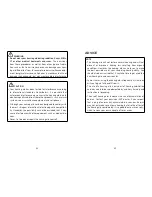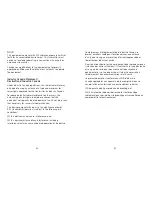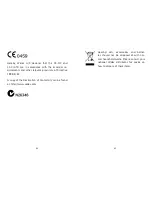
58
59
(emi/emC Compliance).
The Clear™ hearing aid complies with the following emC/emi
standards:
Standard
Test type
note
47 CFR Part
15, subpart C
RF emissions
USA Federal Communications
Commission (FCC) require-
ments for intentional radiators .
EN 303 330-2
V1 .3 .1
RF emissions
incl . Spurious
emission
EMC and radio spectrum mat-
ters for Short Range Devices in
the frequency range 9 kHz – 25
MHz
IEC 60601-1-
2:2007
*adapted
protocol
EMC emission
Immunity, RF
and ESD
Medical electrical equipment .
General requirements for basic
safety and essential perform-
ance .
Electromagnetic compatibility .
EN 301 489-3
V1 .4 .1
Immunity, RF
and ESD
Standard for Low Power Trans-
mitters in the frequency range
9 kHz – 40 GHz
IEC 60118-
13:2004
Immunity
RF Near Field
immunity test
International Product std . for
hearing aids to ensure adequate
immunity to radio interference
from mobile telephones .
ANSI C63 .19-
2001
Immunity
RF Near Field
immunity test
American National Standard
Methods of measurement of
Compatibility between wireless
Communication Devices and
Hearing Aids
* The device was tested in only one orientation that represents the
longest length (or worst case scenario). This is acceptable because
of the relative small size of the device compared to the wavelength
of the RF used in the test.
imPorTanT noTiCe for ProSPeCTive hearing aid
uSerS
Good health practice requires that a person with a hearing loss
have a medical evaluation by a licensed physician (preferably a
physician who specializes in diseases of the ear) before purchasing
a hearing aid. Licensed physicians who specialize in diseases of
the ear are often referred to as otolaryngologists, otologists, or
otorhinolaryngologists. The purpose of medical evaluation is to
assure that all medically treatable conditions that may affect hear-
ing are identified and treated before the hearing aid is purchased.
Following the medical evaluation, the physician will give you
a written statement that states that your hearing loss has been
medically evaluated and that you may be considered a candidate
for a hearing aid. The physician will refer you to an audiologist or a
hearing aid dispenser, as appropriate, for a hearing aid evaluation.
The audiologist or hearing aid dispenser will conduct a hearing aid
evaluation to assess your ability to hear with and without a hear-
ing aid. The hearing aid evaluation will enable the audiologist or
dispenser to select and fit a hearing aid to your individual needs.
If you have reservations about your ability to adapt to amplifica-
tion, you should inquire about the availability of a trial-rental or
purchase-option program. Many hearing aid dispensers now offer
programs that permit you to wear a hearing aid for a period of
time for a nominal fee after which you may decide if you want to
purchase the hearing aid.
Federal law restricts the sale of hearing aids to those individuals
who have obtained a medical evaluation from a licensed physician.
Federal law permits a fully informed adult to sign a waiver state-
ment declining the medical evaluation for religious or personal
beliefs that preclude consultation with a physician. The exercise
of such a waiver is not in your best health interest and its use is
strongly discouraged.






































